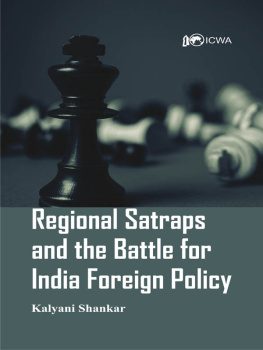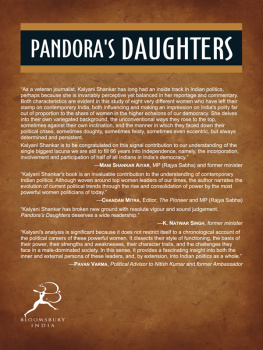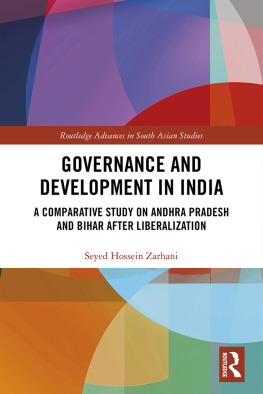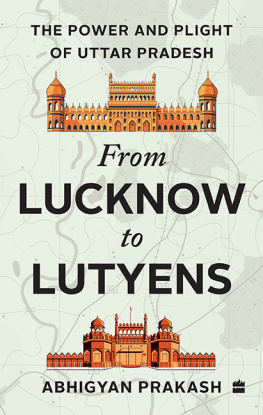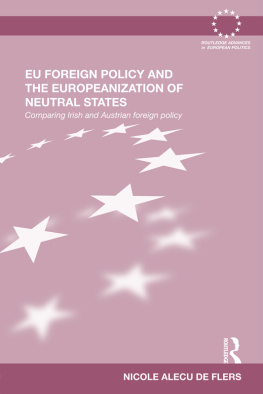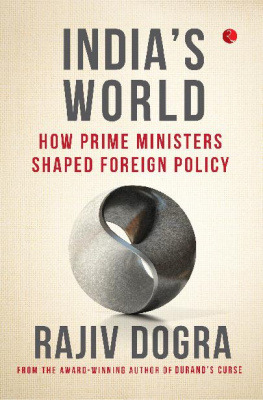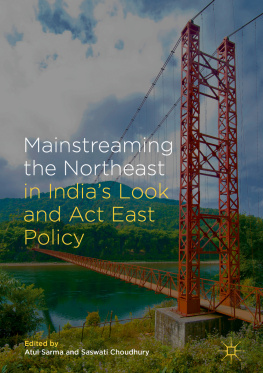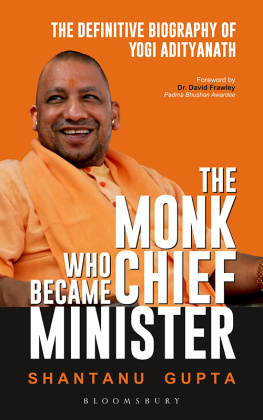Regional Satraps and the Battle for
Indias Foreign Policy
Regional Satraps and the Battle for
Indias Foreign Policy
Kalyani Shankar
Published by
Vij Books India Pvt Ltd
(Publishers, Distributors & Importers)
2/19, Ansari Road
Delhi 110 002
Phones: 91-11-43596460, 91-11-47340674
Fax: 91-11-47340674
e-mail:
web : www.vijbooks.com
Copyright 2017, Indian Council of World Affairs (ICWA)
ISBN: 978-93-86457-33-2 (Hardback)
ISBN: 978-93-86457-34-9 (ebook)
All rights reserved.
No part of this book may be reproduced, stored in a retrieval system, transmitted or utilized in any form or by any means, electronic, mechanical, photocopying, recording or otherwise, without the prior permission of the copyright owner. Application for such permission should be addressed to the publisher.
The views expressed in this book are of the author/contributors in their personal capacity and do not represent the views of the ICWA.
This book is different from others on Indias foreign policy in two ways. First it focuses on the influence and manoeuvrings of the regional satraps on the directions of foreign policy taken by the Union Government. It investigates whether and why the State chieftains are getting more assertive and whether their influence is growing. It also illustrates how Indias Neighbours First policy clashes with the vote bank policy of the Provincial chieftains. I have tried to project the domestic side of Indias foreign policy with particular reference to Sri Lanka, Bangladesh and Nepal.
The second, I have tackled the subject as a journalist and not as an academician. For four decades I have followed and covered the developments in the Provinces mentioned in the book. I have excluded the two big neighbours China and Pakistan as they deserve individual treatment.
A number of people have helped in conducting my study and I wish to thank each one of them. I owe my special thanks to External Affairs Minister Sushma Swaraj who found time to give me her perspective. I particularly wish to thank the Indian envoys in Sri Lanka Yash Sinha and Pankaj Saran in Bangladesh and their staff for helping me meet the important leaders. It was fascinating to interact with the Bangladesh leaders like Gen Ershad, Begum Khaleda Zia, Dipu Moni, Gowher Rizvi, Asaduzzaman Noor, Farooq Sobhan, Rehman Sobhan and H.T. Imam who had been players in Bangladeshs foreign policy. The Daily Star editor Mahfuz Anam needs a special mention. Equally fascinating was to interact in Sri Lanka with Sri Lankan Prime Minister Ranil Wickremesinghe, President Chandrika Kumaratunga, Gen. Sarath Fonseka, Gotabhaya Rajapakse, Sampanthan, Karuna, Wigneswaran Regional SatRapS and the Battle foR indiaS foReign policy and other Sri Lankan leaders as well as the insight given by Panruti Ramachandran, Elangovan, Nedumaran and Col. Hariharan from Tamil Nadu. Prof S. D. Muni, NCP leader D.P. Tripathi and the Nepal Prime Minister Prachanda provided an insight on Nepal. I also wish to acknowledge the help rendered by the Assam Chief Minister Tarun Gogoi, Union minister Gen. V.K. Singh, Former ministers Yashwant Sinha, K. Natwar Singh, Saugata Roy, former Speaker of Lok Sabha Somnath Chatterji, former Foreign Secretaries Muchkund Dubey, Shyam Saran, Lalit Mansingh, Kanwal Sibal, Nirupama Rao and Shiv Shankar Menon. My thanks are also due to D.R. Kartikeyan, Jayant Prasad, Shiv Shankar Mukherji and A.S. Bhasin. New York University Prof. Ralph Buultjens has provided valuable inputs. I wish to acknowledge the help rendered by my daughter Shylashri Shankar.
The importance of the book lies in the information obtained from the primary sources. Thanks to the ICWAs support, I had also visited Sri Lanka and Bangladesh and met with the top leadership involved in their foreign policy. The conclusions are based on inputs from all these sources. Almost all the interviews are recorded. Needless to add that the analysis and the conclusions in this book are mine, and cannot be attributed to the ICWA.
The ICWA has given me all the help required in completing this book and my sincere thanks to the Director General Nalin Surie and his predecessor Rajiv Bhatia. Though this is not an academic book in view of the fact that it is based on information from the primary sources, it may be of interest to researchers on the domestic dimensions of Indias foreign policy. The analysis in this book pertains to the influence of the regional satraps and the Centres response till December 2015.
Independent India is a unique State where religious, ethnic and cultural entities are clubbed together by an overarching nationalism and growing economic networks. The glue is indeed the Union Government. Virtually right from the beginning some hostile forces and rival external powers have tried to unglue India by attacking and weakening the Union Government. This was attempted in various ways by conflict, by diplomacy, by clandestine and other means.
The Central Government has been able to resist all these and defend the States to keep the Union going largely because it had full control and the wherewithal of how to respond to the external challenges. Its grip on the foreign policy was total. The three provisions of the Indian Constitution give the Union Government full powers to conduct foreign affairs. The first is that the Parliament has power to make any law for the whole or any part of the territory of India, for implementing any Treaty, agreement or convention with any country (Art 253). The second is that the Union Government has full executive powers for the implementation of its laws, treaties and agreements (Art 73). The third is to prevent the States from obstructing the administration of laws by the Union Government, the executive powers of the States are to be so exercised as not to impede or prejudice the exercise of the executive power of the Union (Article 257).
The Context
It is time to look back and assess whether there was a national consensus on the governments foreign policy making and also its evolution. Was any attempt made to involve all stake-holders on foreign policy issues? Are the States right in asserting for a bigger role in the making of foreign policy, particularly the Border States with the neighbouring countries in the changing scenario? Has the Centre taken note of the gradual and growing linkage between foreign policy and domestic policy as both impinge on each other? It is indeed a two-way channel, where domestic policies get reflected into foreign policy and in the reverse foreign policy agenda is also used to bolster up domestic policy.
There is no doubt that the State satraps are insisting on a bigger say. Why has it happened? How seriously is it affecting the making of Indias foreign policy and constricting freedom of the Union Government? Is it a temporary phenomenon or will it continue in the future? Will the Centre have to continuously negotiate its policy with these States and will the latter have a veto of sorts on Centres foreign policy? These are the questions that need to be probed.
The Hypothesis
1. The Centre is likely to take unilateral foreign policy decisions even though at times it affected the States in a negative way when it is strong

